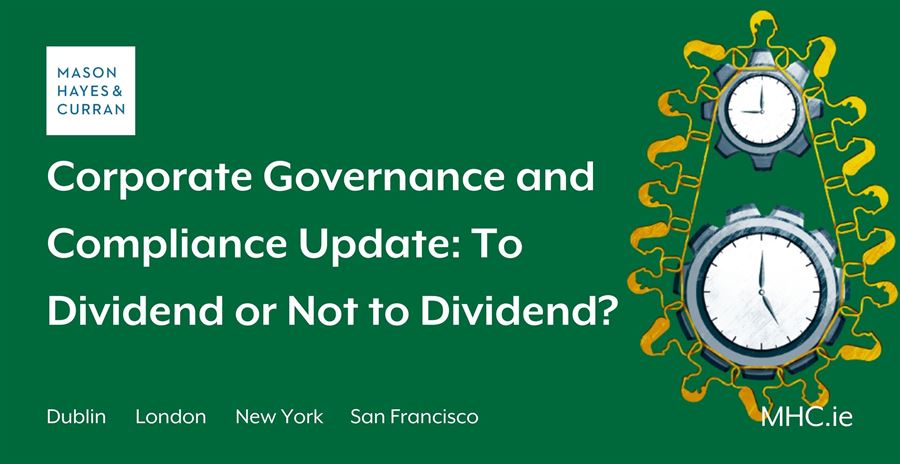
Shareholders often expect an annual dividend. Yet what right does a shareholder have to dividends? We examine how dividends are declared in practice and how companies can satisfy both shareholder expectations and company solvency requirements.
There is no automatic right to dividends under Irish company law. It would be unusual for a company’s constitution to guarantee dividends to its shareholders. Shareholders may agree, between themselves, that a percentage of the available profits will be distributed as a dividend each year. Dividends can only be made by companies with share capital if proposed by the board of directors. A dividend is usually paid in cash. There are alternative methods such as a bonus issue of shares or a dividend by way of transfer of assets. Dividends are usually classified as either final or interim dividends.
Profits available for distribution
Before a company can pay a dividend, it must have sufficient profits available for distribution.
Specific rules relating to distributable profits are contained in the Companies Act 2014 (the Act). These rules must be followed or any dividend made to shareholders will automatically be in breach of the legislation.
Directors may be liable to their company where they authorise payment of a dividend without distributable profits being available for that purpose. It is, therefore, vital (and a statutory requirement) that directors calculate what profits are available for distribution before recommending a final dividend or deciding to pay an interim dividend. This should be done by consulting the last statutory financial statements of the company and, where necessary any interim financial statements so the directors can make an informed decision based on the amount of profits available. 
Final dividends
-
Final dividends are calculated by reference to the last statutory financial statements of a company. Final dividends are recommended by the directors but are declared by shareholders by ordinary resolution, being a resolution passed by a majority of members voting at an annual general meeting. The amount declared by the shareholders cannot exceed the amount recommended by directors.
-
Once a final dividend has been declared and approved by shareholders it is a “debt” of the company owed to the shareholders and can be enforced accordingly.
Interim dividends
-
Interim dividends can be paid at any time during the year and are usually calculated by reference to interim financial statements.
-
Typically interim dividends are determined by the directors but are not declared by the shareholders at a general meeting.
-
By contrast, the directors can decide to change their decision to pay interim dividends at any time up to the point of payment. The members do not have the same right to sue for those dividends.
Declaring a dividend
-
Before recommending a dividend to shareholders the company’s constitution should be checked. If the constitution is silent, sections 124 and 125 of the Act deal with declaring dividends.
-
The directors must resolve to recommend a dividend to shareholders.
-
Dividends paid cannot exceed the amount the directors recommended.
-
All companies should be aware of dividend withholding tax, currently at 20%, payable by the company to the Irish taxation authority in certain circumstances.
Conclusion
The payment of dividends to shareholders is usually optional. Deciding on whether to recommend a final or interim dividend and the amount of that dividend is a matter for the directors. Directors must balance the solvency of the company, before and after paying a dividend, and shareholder expectations. It is important that the correct financial statements are relied on so as to ensure the Company has profits available for distribution before making a dividend to shareholders. Failure to do so could result in the dividend being unlawful and the directors, potentially, being liable to repay it to the Company.
For more information, please contact a member of our Corporate Governance & Compliance team.
The content of this article is provided for information purposes only and does not constitute legal or other advice.




